Nothing is more frustrating than hearing a Whining Noise When Decelerating. Particularly when it’s a whining noise that seems to get louder as you slow down.
It can be difficult to pinpoint the root of the problem, and it’s nerve-wracking not knowing if you’re potentially dealing with something major.
But before you start worrying about expensive repairs or running out to buy a new car, there are some steps you can take to diagnose and identify what may be causing the issue.
We’ll also share tips on how to diagnose issues without incurring unnecessary repair costs so that you can make an informed decision about how best to proceed.
So grab your toolbox (or smartphone) and let’s dive into this automotive mystery together!
Whining noise when decelerating can indicate various mechanical problems such as issues with tires, drive shaft, transmission fluid, fuel pump, or power deficiency.
Table of contents
Possible Causes of Whining Noise When Decelerating:
| Possible Cause | Symptoms | Solution |
|---|---|---|
| Loose or damaged serpentine belt | The serpentine belt is a long, ribbed belt that powers several accessories on your car, including the alternator, power steering pump, and air conditioning compressor. If the belt is loose or damaged, it can cause a whining noise when you decelerate. | Tighten or replace the serpentine belt. |
| Worn or damaged bearings | The bearings in your car’s wheels, transmission, and other components can wear out over time and cause a whining noise when you decelerate. | Replace the worn or damaged bearings. |
| Low fluid levels | If the fluid levels in your car’s transmission, power steering system, or differential are low, it can cause a whining noise when you decelerate. | Check the fluid levels and add more fluid if necessary. |
| Faulty component | In some cases, a whining noise when decelerating can be caused by a faulty component, such as a bad alternator or power steering pump. | Replace the faulty component. |
If you hear a whining or humming noise when decelerating, there could be several possible causes.
One of the most common culprits is worn out brake pads or rotors. When the brake pads wear down, it can cause a metal-on-metal grinding sound that gets louder as you slow down.
Low power steering fluid could also be to blame for the noise. A lack of fluid can cause your power steering pump to work harder than normal, resulting in whining sounds coming from under the hood.
Another possible culprit is transmission problems. Issues with the gears or bearings in your transmission can cause a variety of noises, including whining sounds when decelerating.
To properly diagnose the cause of the noise, it’s important to check each component related to these potential issues. You should inspect your brakes for wear and tear, check your power steering fluid level and condition, and examine your transmission fluid for any signs of damage or low levels.
1. Worn Out Brake Pads or Rotors:

One of the possible causes of a whining noise when decelerating is worn out brake pads or rotors. If you hear the noise coming from the front of your car, it could indicate that there’s an issue with your brakes.
To diagnose if this is indeed the cause, you should check your brakes first. Listen to the sound carefully and try to locate where it’s coming from.
If it sounds like it’s coming from one side of your car, then you may have worn-out brake pads on that side.
Another thing to check would be your brake rotors, which are essentially large metal discs that rotate along with the wheels.
If these rotors become warped or damaged over time due to frequent use or overheating during hard braking scenarios, they can also produce a whining sound when slowing down.
If you suspect that worn-out brake pads or rotors could be causing the whine in your car while decelerating, it’s important to get them replaced as soon as possible for safety reasons.
2. Low Power Steering Fluid:
If you suspect that low power steering fluid could be causing the whining noise when decelerating, you should check the fluid level immediately. This is a quick and easy task that you can do yourself.
Locate the power steering fluid reservoir under the hood of your car and check the level. If it’s below the minimum line, then you will need to add more fluid.
Use a funnel to avoid any spills and make sure to use the recommended type of power steering fluid for your vehicle.
If adding more fluid doesn’t fix the issue, then there may be a leak in your system which needs professional attention. Continuing to drive with low power steering fluid levels could lead to significant damage to your vehicle’s power steering system or even cause an accident due to loss of control over your car’s wheels.
Remember, regular maintenance checks of all fluids including power steering is crucial in preventing these types of issues from occurring.
3. Transmission Problems:

If you suspect that the whining noise is coming from the transmission, it’s important to investigate further.
One possible cause could be low transmission fluid levels, so you should start by checking the fluid level and adding more if necessary.
Another potential cause of a whining noise in the transmission could be worn or damaged bearings.
The front bearing in particular can wear down over time and create a whine or other abnormal noises when decelerating at high speed.
If your vehicle has high mileage or has been driven in harsh conditions, such as towing heavy loads, this can put extra strain on the transmission and lead to premature wear.
In some cases, a complete transmission repair may be necessary to resolve the issue.
It’s important to address any potential issues with your vehicle’s transmission promptly to avoid causing further damage and costly repairs down the line.
If you’re not comfortable diagnosing and repairing these issues yourself, it may be best to seek professional help from a mechanic who specializes in transmissions.
How to Diagnose a Whining Noise When Decelerating?
If you’re experiencing a whining noise when decelerating, it’s important to diagnose the cause of the problem before attempting any repairs. Here are some steps you can take to diagnose the issue:
- Listen carefully to the location of the sound: Is it coming from the engine, front or rear of the car, or somewhere else?
- Check your transmission fluid level and condition: Low power steering fluid or transmission problems could be causing the noise.
- Inspect your brakes for wear and tear: Worn out brake pads or rotors could also be causing the issue.
- Take note of your speed and mileage: If you notice that the noise becomes louder as you go faster or put more miles on your car, this could indicate a problem with your driveshaft.
By following these steps, you can get a better idea of what might be causing the whining noise when decelerating in your specific situation.
Remember to take note of any additional sounds or symptoms that may help pinpoint potential issues.
Check the Brakes:
If you suspect that worn out brake pads or rotors are the cause of the whining noise when decelerating, it’s important to check them as soon as possible.
This is not only for your safety but also to avoid further damage to other parts of your vehicle.
Start by locating where the noise is coming from and inspecting the front brakes. Look for any signs of wear on both the pads and rotors.
If you notice any uneven wear or grooves in the rotor surface, this could be a sign that they need to be replaced.
It’s also a good idea to check if there is enough brake pad material left by measuring their thickness. If they’re too thin, they’ll need replacing as well.
Additionally, make sure all parts related to brakes such as calipers and pins are functioning properly. Sometimes debris can get stuck between these parts and cause unwanted noises while braking.
Inspect the Power Steering Fluid:
If you hear a whining noise when decelerating, it could be due to low power steering fluid.
To inspect the power steering fluid, first, locate the reservoir under the hood of your car. Check the level and condition of the fluid – if it’s low or dirty, this could be causing the noise.
- To check for low power steering fluid:
- Park your car on a level surface
- Turn off your engine
- Locate the power steering pump and its reservoir
- Clean any debris from around it
- Remove the cap from its reservoir and look into it
- If you see that there is no oil in there at all, then add more until it reaches where it should
- If adding more fluid doesn’t fix the issue, then there may be an underlying problem with your car’s power steering system. Take your vehicle to a professional mechanic for further inspection and repair.
Remember that timely repairs are necessary to avoid bigger problems in future. Neglecting small issues may lead to substantial expenses for major repairs downroad.
Check the Transmission Fluid:
If you suspect that a whining noise when decelerating could be caused by transmission problems, then checking the transmission fluid level is a good place to start.
Make sure your vehicle is on level ground and has been running for at least 5 minutes before checking the fluid.
Locate the dipstick under the hood of your car, remove it, and wipe it clean with a rag or paper towel. Then reinsert it into its tube completely and pull it out again to check the fluid level.
If the fluid level is low, this could indicate a leak somewhere in your transmission system. In this case, you may need to add more fluid or take your car in for repairs if there’s significant damage.
Other symptoms of transmission issues include slipping gears or difficulty shifting gears while driving.
If you’re noticing any of these problems along with a whining noise when decelerating, then bring your car to an experienced mechanic as soon as possible for diagnostics and repair recommendations.
Focus On the Noise Carefully:
One of the easiest ways to diagnose a whining noise when decelerating is by listening carefully to the sound and trying to locate its origin.
While driving, pay close attention to the speed at which you hear the noise and if it’s coming from the front or back of your car.
Some members on a car forum who also experienced this problem suggest that the whine could be caused by bad wheel bearings or worn-out power steering fluid.
If you’re not sure what’s causing the noise, try quoting some posts from other drivers with similar issues in forums dedicated to diagnosing car problems.
How to Fix a Whining Noise When Decelerating?
If you’ve diagnosed the cause of your whining noise when decelerating and determined that repairs are necessary, here are some ways to fix the issue:
First, determine which component is causing the noise. Depending on the location and sound of the noise, it could be a transmission problem or worn out brake pads or rotors.
For worn out brake pads or rotors, replace them. This should eliminate any whining noises caused by friction between these parts.
If low power steering fluid is causing the issue, refill it as soon as possible. A lack of power steering fluid can lead to damage in the system if not addressed quickly.
For transmission problems that are resulting in excess noise during deceleration, take your vehicle to a professional mechanic for repairs.
Replace Worn Out Brake Pads or Rotors:
If you have identified that worn-out brake pads or rotors are the cause of the whining noise when decelerating, it’s essential to replace them as soon as possible.
Neglecting brake issues can lead to decreased braking power and even brake failure.
Replacing brake pads and rotors is a fairly straightforward process for those with some experience in automotive maintenance.
However, if you’re not comfortable doing this yourself, it’s best to seek professional help.
When replacing your brakes, it’s also important to check other components such as calipers and hoses for any signs of wear or damage.
Doing so will ensure that your braking system is functioning properly and will improve overall safety while driving.
Refill Low Power Steering Fluid:
If your car is making a whining noise when decelerating, it could be due to low power steering fluid. This issue can cause the pump to work harder than it should, leading to a whine or whirring sound.
To check if this is the problem, pop open your hood and locate the power steering reservoir.
It typically has a cap labeled “power steering” and will likely be located on the driver’s side of the engine compartment.
Remove the cap and check the fluid level using either a dipstick or by visually inspecting where on the container that level lies.
If it’s low, refill with recommended fluid up to its appropriate level as mentioned in owner’s manual specifications.
Keep in mind low power steering fluid may not always be at fault for whining sounds while decelerating but it’s best practice to have all fluids checked regularly during maintenance.
Repair or Replace Transmission:
If the whining noise when decelerating is originating from the transmission, it could indicate a serious problem that requires immediate attention.
Issues with gears, bearings, and other components can lead to a whining sound.
One possible solution is to repair or replace the transmission entirely. This may be necessary if there is significant damage or wear and tear on the internal components of the transmission.
It’s important to have an experienced mechanic diagnose the issue before jumping to any conclusions.
According to some forum posts, members have reported having their transmissions replaced after experiencing similar whining noises while decelerating.
If you suspect that your transmission may be causing the noise, it’s best to take your car in for a professional diagnosis as soon as possible.
To prevent costly repairs like these in the future, make sure to keep up with regular maintenance tasks including checking fluid levels such as transmission fluid regularly and changing them when needed.
When to Seek Professional Help?
If you have diagnosed the cause of the whining noise when decelerating and find that it requires more advanced knowledge or tools to fix, seeking professional help is recommended.
This is especially true if the problem originates from your car’s transmission or power steering fluid.
Taking your car to a trusted mechanic can save you time and money in the long run by getting an accurate diagnosis and fixing the issue correctly.
Furthermore, if any repairs require special equipment or expertise, a professional mechanic would be able to handle them with ease.
Don’t hesitate to get professional help whenever necessary to avoid further complications or potential safety hazards on the road.
If you are unsure about what could be causing the whine while driving at speeds below 30 miles per hour or if there are additional sounds accompanying it, it might be worth checking with a mechanic first before taking action yourself.
Prevention Tips to Avoid Whining Noise When Decelerating:
Preventing a whining noise when decelerating is always better than having to diagnose and fix the root cause of the problem. Here are some tips that can help you avoid this issue:
Regular Maintenance:
Regular maintenance is essential for the health and longevity of your car, including preventing a whining noise when decelerating.
Make sure to check fluid levels such as power steering fluid regularly, especially if you notice any changes in noise or performance.
Keeping up with basic upkeep like oil changes can also help prevent problems that may contribute to a whining sound.
Additionally, regularly inspecting brake pads and rotors can help detect any wear before it becomes a bigger issue. Addressing small problems early on saves both time and money in the long run.
Finally, be sure to consult your owner’s manual for recommended maintenance schedules based on mileage and speed, as these can differ between makes and models.
Timely Repairs:
One of the most important prevention tips to avoid a whining noise when decelerating is to prioritize timely repairs.
If you notice any unusual sounds or changes in your car’s performance, it’s crucial to take immediate action and bring your vehicle in for an inspection.
Ignoring the problem could lead to further damage, resulting in more extensive and expensive repairs down the line.
For example, if the cause of the whining noise is worn out brake pads or rotors, driving with them for too long can not only create additional noises but also compromise your safety by reducing stopping power.
Regular maintenance check-ups are also key to preventing issues that may cause a whine while decelerating.
Keeping up with scheduled maintenance such as oil changes, tire rotations, and fluid replenishment can help catch potential problems early on before they start causing costly damage.
Conclusion and final thoughts 💭
A whining noise when decelerating can indicate multiple problems with your vehicle, ranging from worn brake pads or rotors to low power steering fluid or transmission issues.
It is crucial to diagnose the cause of the sound accurately before making any repairs to avoid unnecessary modifications and expenses.
Regular maintenance and timely repairs are essential in preventing such noises from occurring in the future.
If you suspect a serious problem with your car’s transmission or other mechanical issues, it’s recommended to seek professional help immediately rather than trying to fix it yourself as this could potentially make the problem worse.
Remember always to check your fluids regularly and listen carefully for sounds originating from the front end of your car while driving at different speeds and miles per hour.
Latest Posts:
- Can WD-40 Remove Scratches on Cars? (Hint: Yes, but…)
- Can You Use a Drill to Polish Your Car? (We Tried it Out!)
- Should You Cover Car Scratches With Stickers? (REVEALED!)
- Buick Service Stabilitrak: (Causes & 100% Guaranteed Fix!)
- Common Holden Trax Problems (Causes & 100% Proven Fixes!)
- Jeep Commander Transmission Over Temp: (Guaranteed Fix!)

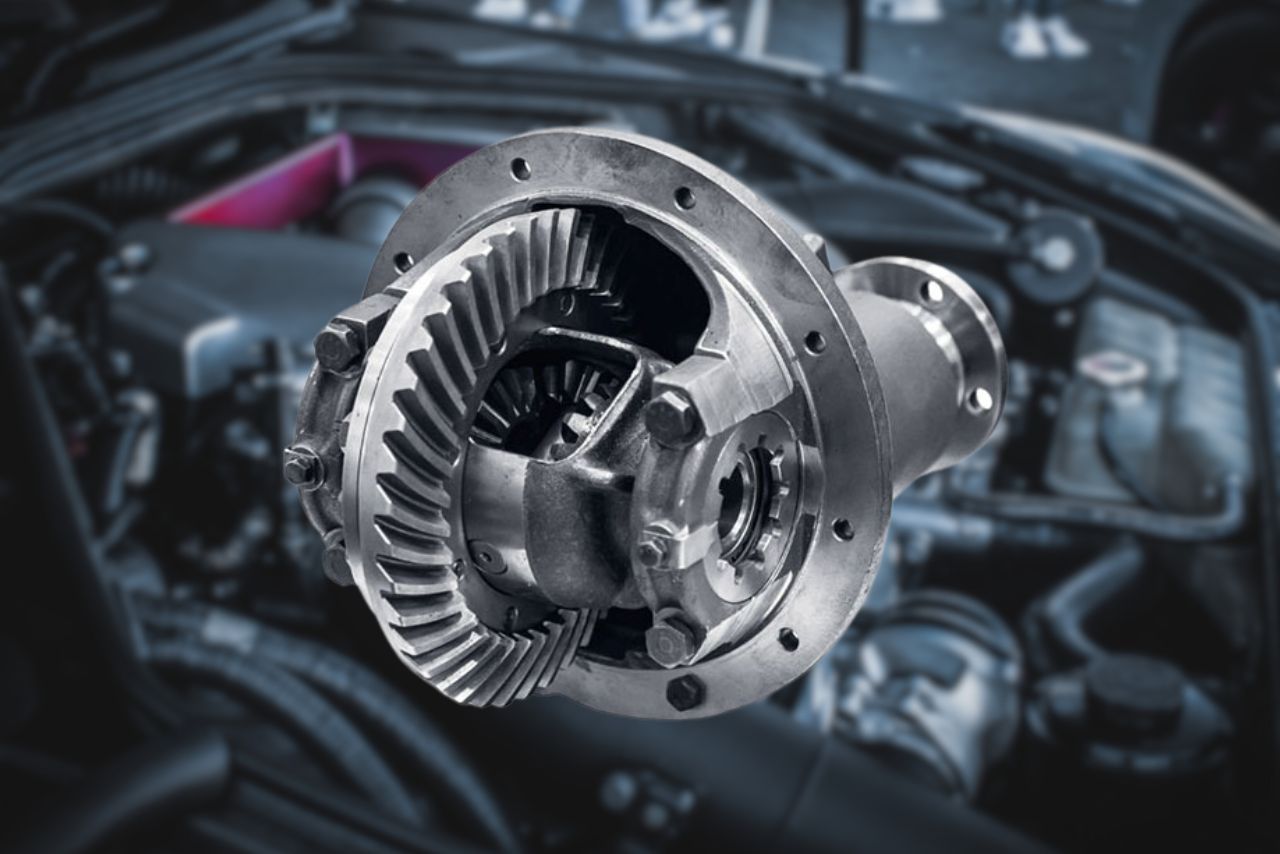
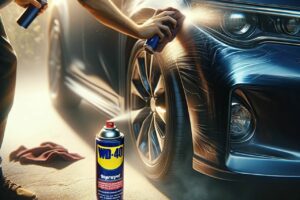


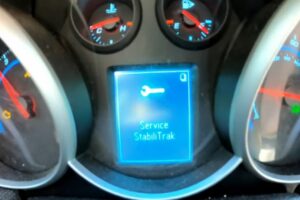

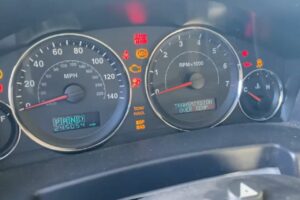
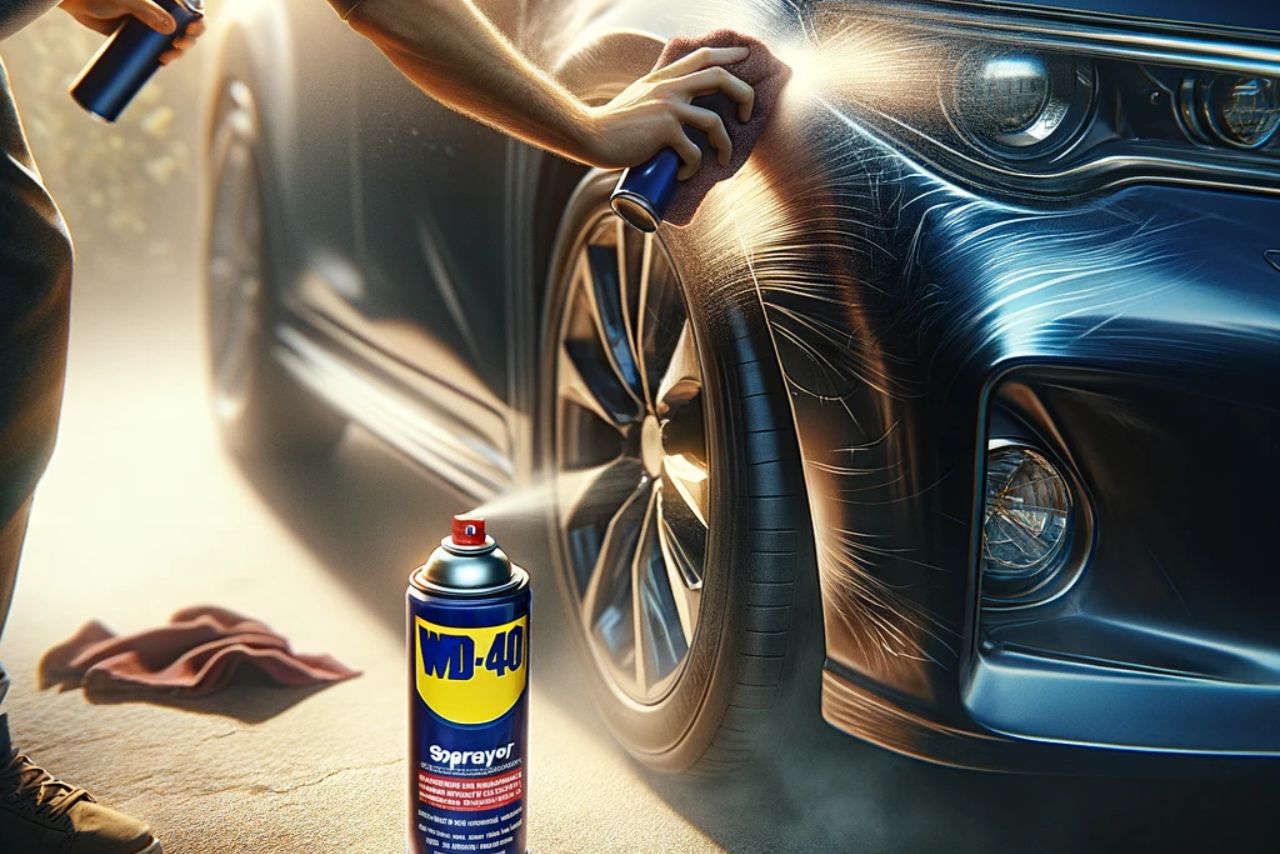
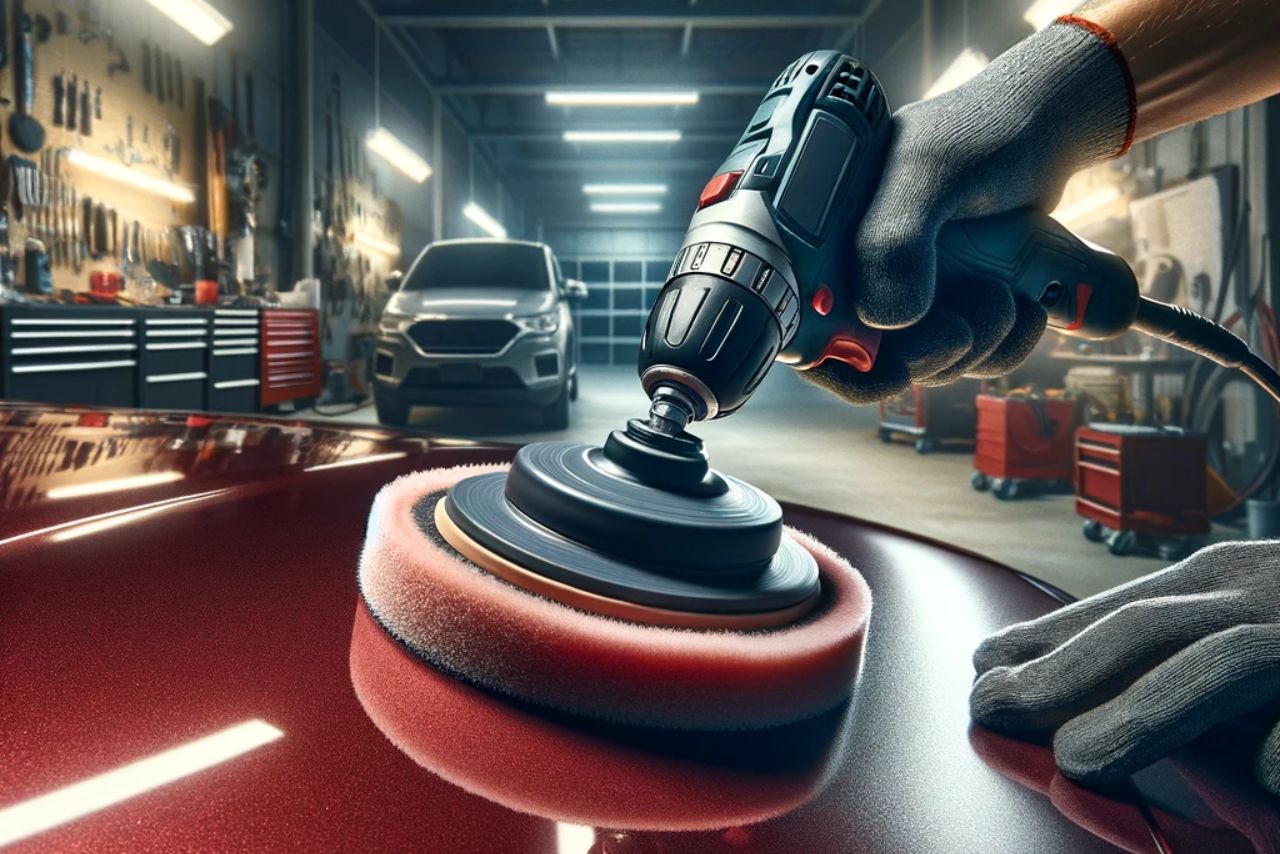

Leave a Reply